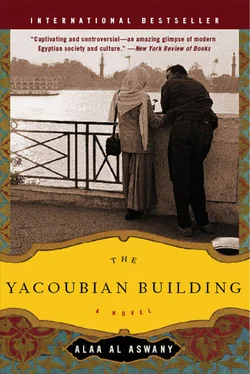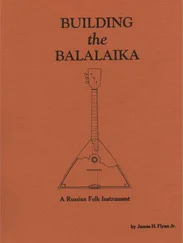Alaa Al Aswany - The Yacoubian Building
Здесь есть возможность читать онлайн «Alaa Al Aswany - The Yacoubian Building» весь текст электронной книги совершенно бесплатно (целиком полную версию без сокращений). В некоторых случаях можно слушать аудио, скачать через торрент в формате fb2 и присутствует краткое содержание. Год выпуска: 2006, ISBN: 2006, Издательство: Adobe Acrobat eBook Reader, Жанр: Современная проза, на английском языке. Описание произведения, (предисловие) а так же отзывы посетителей доступны на портале библиотеки ЛибКат.
- Название:The Yacoubian Building
- Автор:
- Издательство:Adobe Acrobat eBook Reader
- Жанр:
- Год:2006
- ISBN:978-0-06-087813-9
- Рейтинг книги:5 / 5. Голосов: 1
-
Избранное:Добавить в избранное
- Отзывы:
-
Ваша оценка:
- 100
- 1
- 2
- 3
- 4
- 5
The Yacoubian Building: краткое содержание, описание и аннотация
Предлагаем к чтению аннотацию, описание, краткое содержание или предисловие (зависит от того, что написал сам автор книги «The Yacoubian Building»). Если вы не нашли необходимую информацию о книге — напишите в комментариях, мы постараемся отыскать её.
The Yacoubian Building — читать онлайн бесплатно полную книгу (весь текст) целиком
Ниже представлен текст книги, разбитый по страницам. Система сохранения места последней прочитанной страницы, позволяет с удобством читать онлайн бесплатно книгу «The Yacoubian Building», без необходимости каждый раз заново искать на чём Вы остановились. Поставьте закладку, и сможете в любой момент перейти на страницу, на которой закончили чтение.
Интервал:
Закладка:
Abduh looked down and whispered words of thanks. Hatim moved up to him until their bodies were completely joined and said to himself in French as he approached Abduh’s thick lips, “ Quelle belle journée! ”

To: Taha Muhammad el Shazli, Citizen
Yacoubian Building 34,
Talaat Harb Street
Cairo
Greetings:
With reference to your complaint presented to the Presidency of the Republic concerning your rejection by the acceptance examination at the Police Academy: We have to inform you that the matter has been reviewed with the director of the Police Academy and it is evident to us that the complaint is unfounded. We wish you success.
Please accept the assurance of our highest respect, General Hassan Bazaraa
Director, Public Complaints Administration
Presidency of the Republic

The neighbors were used to hearing the sounds of Zaki el Dessouki and his sister Dawlat quarreling. It happened a lot and no longer aroused their surprise or curiosity. This time, however, the quarrel was different — more like a terrible explosion. Screams, ugly insults, and the loud sounds of hand-to-hand fighting reached the residents, who opened their doors and came out to reconnoiter. Some murmured nervously, preparing to intervene. Dawlat shouted in an angry voice, “You lost my diamond ring, you shit?”
“Talk decently, Dawlat!”
“I wouldn’t be surprised if you didn’t give it to one of your prostitute friends!”
“I’m telling you, talk decently!”
“I am still decent, in spite of you! It’s you that’s the laughingstock everyone despises! Get out of my house, you son of a bitch, you junkie!”
“This is my apartment,” shouted Zaki Bey in an exhausted voice.
“Not so, sweetheart. It’s the house of my father, the respected basha, which you have defiled with your filth!”
Sounds of slaps and a battle followed, the door of the apartment opened, and Dawlat pushed Zaki outside, shouting, “Get out! I don’t ever want to see your miserable face again!”
Zaki Bey came out and, catching sight of the throng of neighbors, turned around and said, “As you wish, Dawlat. I’m going.”
Dawlat slammed the door and the sound of the bolt was heard as she locked it. The neighbors went up to Zaki Bey and said that what had happened just now was quite inappropriate and that whatever differences there might be, it was shameful for respectable people such as Zaki Bey and his sister to fight like that. Zaki Bey nodded, smiling sadly as he withdrew, and before entering the elevator told the neighbors in a conciliatory, apologetic tone, “Sorry to have disturbed you, everyone. It’s just a misunderstanding. God willing, everything will get sorted out.”

The numerous, oft-repeated stories about the politician Kamal el Fouli assert that he grew up in an extremely poor family from Shibin el Kom, in the governorate of El Minoufiya. Despite his poverty he was extremely intelligent and ambitious, obtaining a general secondary certificate in 1955 with one of the top placements in the nation, and he plunged into politics the moment he joined the Faculty of Law. Kamal el Fouli became a member of each of the regime’s political structures in succession — the Liberation Organization and the National Union, followed by the Socialist Union and the Vanguard Organization, then the Center Platform, the Egypt Party, and, finally, the Patriotic Party. Throughout these shifts, he was always the most enthusiastic and loudest voice in support of the principles of the governing party. During Nasser’s era he gave lectures and wrote works on the necessity for and historical inevitability of the socialist transformation. And when the state switched to capitalism, he became one of the greatest supporters of privatization and the free economy, mounting from beneath the parliament dome a fierce and celebrated campaign against the public sector and totalitarian ideas in general. He was one of the few Egyptian politicians who had managed to keep a seat in parliament for more than thirty consecutive years.
While it’s true that Egyptian elections are always fixed in favor of the ruling party, it is also true that Kamal el Fouli is endowed with a real talent for politics that would necessarily have enabled him to assume the highest positions of state even in a democratic society. This same authentic talent, however, like so many talents in Egypt, has been diverted, distorted, and adulterated by lying, hypocrisy, and intrigue till the name of Kamal el Fouli has come to represent in the minds of Egyptians the ver y essence of corruption and hypocrisy.
He has risen through the party hierarchy to become secretary of the Patriotic Party and the primary arbiter of elections for the whole of Egypt, for he nominates or rejects whomever he wishes to or from the party’s list and personally supervises the fixing of elections from Alexandria to Aswan. He takes large bribes from the candidates to guarantee that the elections are fixed in their favor while at the same time covering up his corruption with all sorts of tricks, such as swapping favors and financial privileges that divert millions to leading politicians.
El Fouli also keeps secret security reports and documents proving the malfeasances of officials so that he can use them to blackmail or if need be destroy them. At political meetings, whether in the People’s Assembly or the Patriotic Party, everyone shuts up when Kamal el Fouli speaks. Indeed a single stern look from him is enough to strike terror into the heart of any official. There are numerous celebrated incidents related about him in this context in which he made mincemeat of leading officials in public because they said something that he didn’t like, an example being the ruthless campaign that he led a few years ago (on behalf of leading officials) against Dr. El Ghamrawi, governor of the Bank of Egypt, which led in the end to the latter’s resignation. A more recent example occurred last year and affected the minister of religious endowments, who enjoyed a certain popularity that made him imagine that he was powerful and influential. Under the influence of this mistaken impression, the minister got up at a meeting of the Political Bureau of the Patriotic Party and made a violent attack on political corruption, demanding that party posts be cleansed of deviant elements and profiteers. Kamal el Fouli made a sign to the minister to bring his speech to a close, but the minister continued, ignoring him. At this point El Fouli interrupted him mockingly and, turning dramatically to those present, said, “Well, well! Whatever’s got into you, my dear minister? Given that Your Excellency is so concerned about fighting corruption, you might want to begin with yourself, sport. You borrowed ten million pounds from the Development Bank and for the last five years you’ve refused to pay the installments. By the way, the officials at the Bank intend to bring a case and make an example of you” — at which, the minister turned pale and sat down in silence amid the wisecracks and laughter of those present.

Hagg Azzam was well aware of all this and so as soon as he decided to put himself forward as a candidate in the elections for the People’s Assembly he sought an appointment with Kamal el Fouli, who kept him waiting for a few weeks, then finally gave him one at the office of his son, the lawyer Yasser el Fouli, on Shihab Street in El Mohandiseen. After Friday prayers, Hagg Azzam and his son Fawzi went to the appointment. The office was empty except for security staff, Kamal el Fouli, and his son. Azzam and El Fouli embraced and exchanged prayers, compliments, and jokes, and one might have been forgiven for thinking the two were old friends who loved, understood, and respected each other.
Читать дальшеИнтервал:
Закладка:
Похожие книги на «The Yacoubian Building»
Представляем Вашему вниманию похожие книги на «The Yacoubian Building» списком для выбора. Мы отобрали схожую по названию и смыслу литературу в надежде предоставить читателям больше вариантов отыскать новые, интересные, ещё непрочитанные произведения.
Обсуждение, отзывы о книге «The Yacoubian Building» и просто собственные мнения читателей. Оставьте ваши комментарии, напишите, что Вы думаете о произведении, его смысле или главных героях. Укажите что конкретно понравилось, а что нет, и почему Вы так считаете.












